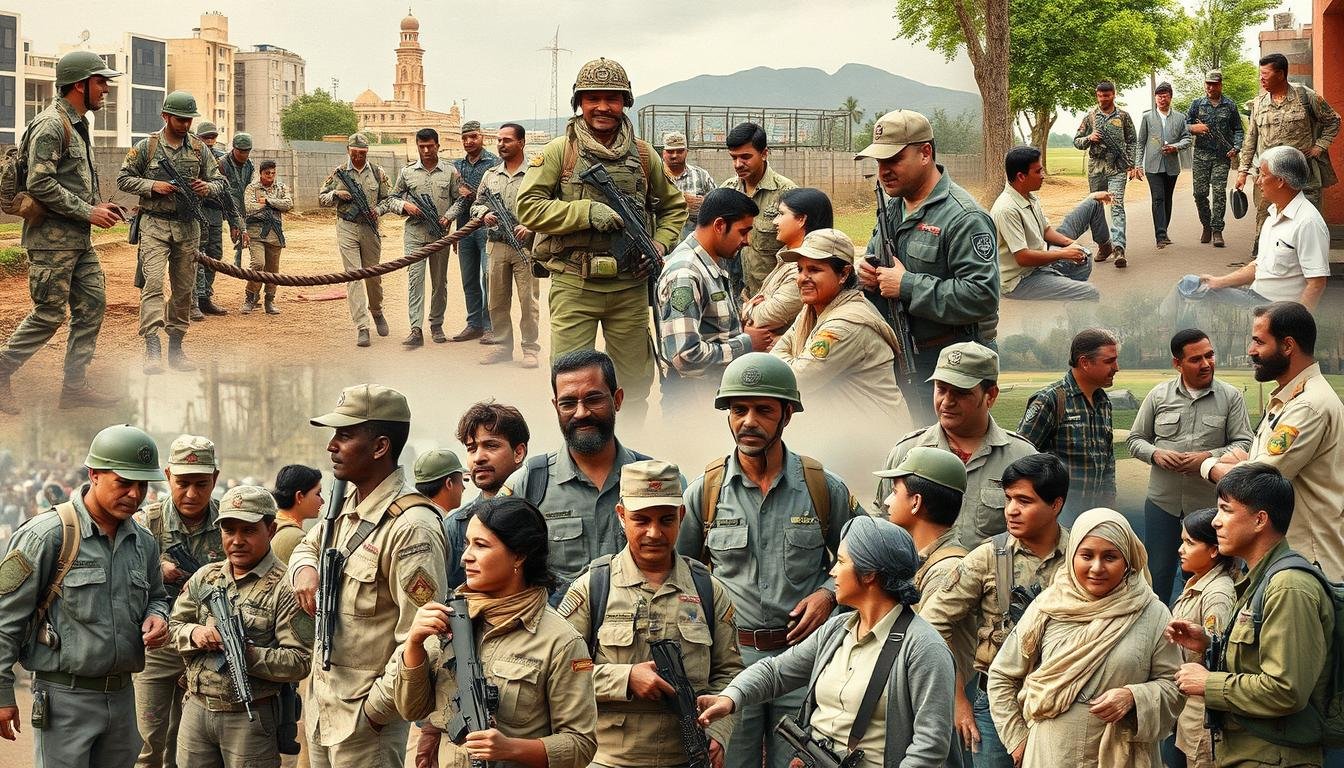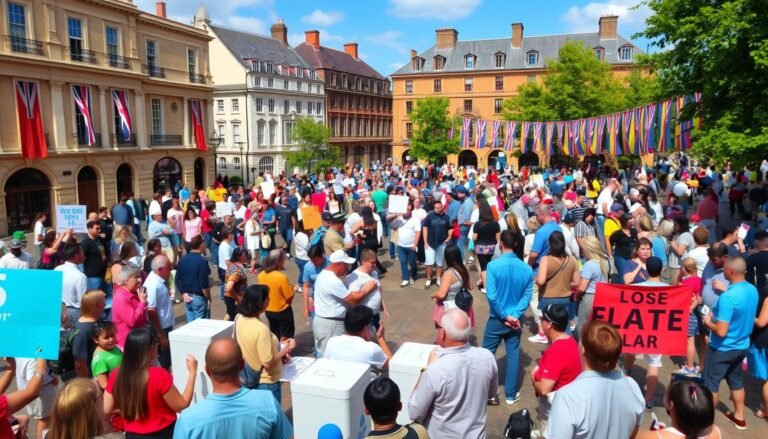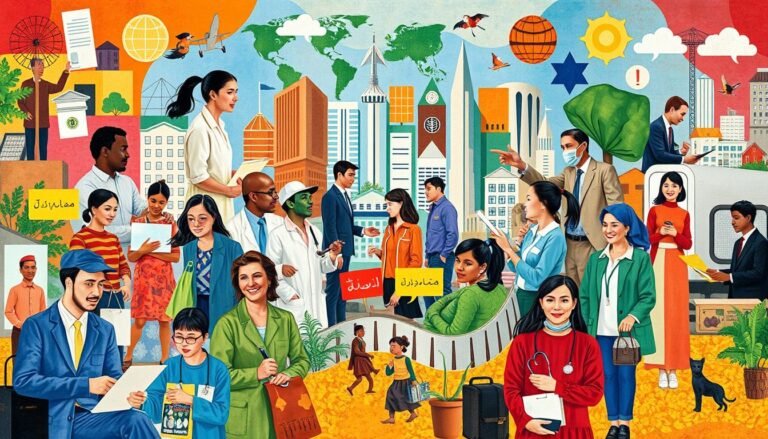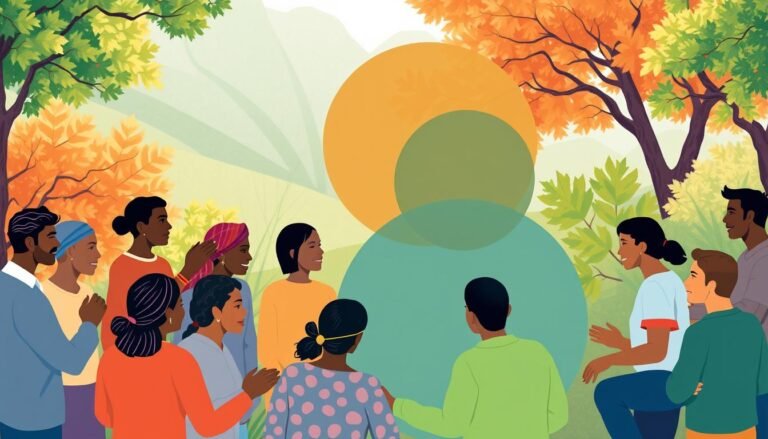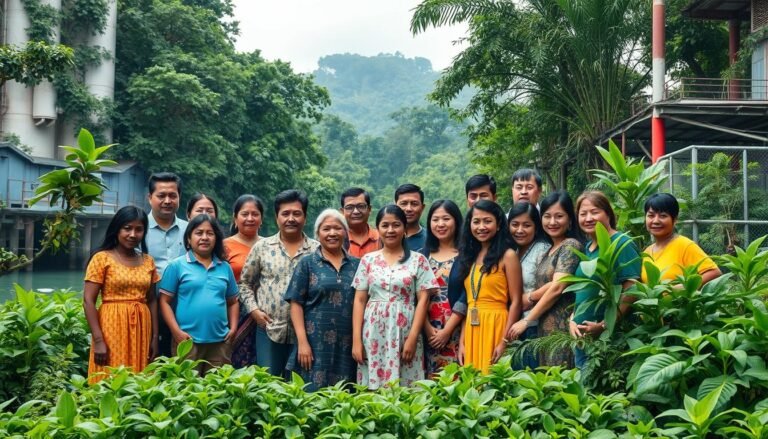Sociology of the Military: Society and Warfare
How does the military shape our society, and how does society influence warfare? This question is key to understanding military sociology. It looks at how armed forces and civilian life are connected. We’ll see how military institutions affect our social life and how society changes warfare.
Military sociology started after World War I. Psychologists in the U.S. began studying recruitment and how to pick the right people. It grew more during World War II, with studies on why troops fought, how they acted in combat, and race in the military.
Morris Janowitz is a big name in military sociology. His book, “The Professional Soldier,” started a lot of research. It looked at how military groups change over time.
With the move from big armies to more tech-savvy forces, military sociology changed too. It now looks at things like volunteer forces, women and LGBTQ+ in the military, and cyber warfare.
Key Takeaways
- Military sociology looks at how armed forces and society are connected.
- It became more important after World War I and II.
- Morris Janowitz is seen as the start of modern military sociology.
- It covers topics like gender in the military and tech in warfare.
- How civilians and the military work together is a big part of it.
Introduction to Military Sociology
Military sociology looks at the armed forces as a special group. It studies how military culture affects how service members act together. It also looks at how war and social change shape the military’s place in society.
Definition and Scope
This field goes beyond just looking at the military’s structure. It digs into the social life of military people, their shared experiences, and how their job changes society. It covers many topics, like how civilians and the military interact and gender issues in the military.
Historical Development
After World War II and the Cold War, military sociology became more popular. There was a big increase in research and books written. From 1892 to 1992, over 4,228 works were published on US military sociology. A review before 9/11 found 1,000 references, showing how fast the field grew.
Key Themes and Concepts
Military sociology talks about many things. These include:
- Civilian-military relations
- Military professionalism
- Veteran transition
- Gender in the military
- The military-industrial complex
A key book in this field is 264 pages long with 12 illustrations. It covers these themes in 13 chapters. Critics have praised it for its deep look at military culture and its role in teaching future military-social science thinkers.
The Military as a Social Institution
The military is a key part of American life, affecting millions of people. It has 3.5 million members, including active-duty troops, National Guard, Reserves, and civilians. This includes over 2.5 million family members of those in the military.
Young people, those from the South, and immigrants are more likely to join the military. Women now make up about 25% of the military, showing progress in including more women. The military now welcomes LGBTQ+ individuals openly, too.
The military plays a big role in society. It creates millions of jobs every year, helping the economy. Its research has led to big tech advances, like the Internet. This shows how closely the military and civilian worlds are linked.
More military families are now joining, which could lead to a military class in America. This “soldiers making soldiers” trend makes us think about the military’s diversity. It also makes us wonder if it truly reflects American society.
“The U.S. military does not mirror the demographics or values of the larger American society but rather reflects it to some extent.”
The military’s role in society is still very important. It affects not just national security but also our social norms, economy, and technology.
Civil-Military Relations
Civil-military relations are complex. They involve how the military and civilian society interact. This looks at the balance of power and control between them.
Civilian Control of the Military
In democratic societies, civilians control the military. This means elected officials make decisions on security and defense, not military leaders. Over time, research has looked at different parts of this relationship.
Military Influence on Society
The military’s impact goes beyond fighting. It affects politics, economy, and society. For example, changing from conscription to an all-volunteer force in the U.S. changed the military and how society sees it.
- In 2022, women made up 15.6% of the active-duty Army
- Black soldiers’ representation increased from 18% to 31% of Army recruits by 1977
Public Perception of the Armed Forces
What people think about the military is key to civil-military relations. Researchers study how society sees the military and its values. They look at military culture and veterans in politics.
“The field of civil-military relations has grown and reached maturity throughout the Cold War period.”
Knowing about civil-military relations is crucial for a strong national defense and democracy. It needs ongoing research and talks to understand the complex relationship between the military and society.
Military Culture and Values
Military culture shapes the identity of armed forces. It includes unique norms, values, and behaviors. These set military life apart from civilian society. The process of socialization in the military instills these cultural elements in service members.
Hierarchy and discipline are key to military culture. They create a structured environment where orders are followed without question. This structure is crucial for maintaining operational efficiency in high-stress situations.
Esprit de corps, or team spirit, is another key aspect of military culture. It fosters a sense of belonging and loyalty among service members. This camaraderie often extends beyond active duty, creating lifelong bonds between veterans.
“The military doesn’t just train soldiers; it creates a brotherhood.”
Recent years have seen changes in traditional military culture. Increased diversity and specialization have led to a gradual civilianization process. Despite these changes, combat-related functions continue to distinguish military culture from civilian organizations.
| Aspect | Traditional Military Culture | Modern Military Culture |
|---|---|---|
| Diversity | Limited | Increasing |
| Specialization | Generalized roles | Highly specialized roles |
| Technology | Basic | Advanced |
| Gender roles | Predominantly male | More inclusive |
The Department of Defense’s 2011 report on “Population Representation in the Military Services” provides insights into the changing face of military culture. It highlights shifts in demographic breakdowns within the armed forces, reflecting broader societal changes.
Gender and Diversity in the Military
The military has changed a lot in terms of gender and race. This change shows how society is evolving and affects how the military works and its culture.
Women in the Armed Forces
More women are joining the military now. At West Point, the number of female cadets went up over three years. During Operations Desert Shield and Desert Storm, women showed they could do important jobs, breaking old gender rules in the military.
LGBTQ+ Inclusion
Adding LGBTQ+ people to the military has taken time. Policies have moved from not allowing them to accepting them, even though there are still hurdles. Research shows that being inclusive helps units work better together and makes the military stronger.
Racial and Ethnic Diversity
The history of race and the military is complex. A 1997 study showed more racial diversity in the U.S. Army. Today, there are ongoing efforts to make the military more representative of the country.
| Year | Women in Military (%) | Racial Minorities (%) | LGBTQ+ Open Service |
|---|---|---|---|
| 1980 | 8.5 | 27 | No |
| 2000 | 14.7 | 36 | No |
| 2020 | 16.5 | 43 | Yes |
Even with progress, there are still challenges. A 1995 survey by the Department of Defense found sexual harassment was a big problem. Research on gender in the UK and US militaries shows both good changes and still some issues in making the military truly inclusive.
Sociology of the Military: Society and Warfare
Military sociology looks at how armed forces and society are connected. It shows how war and social change affect our world. The military is a big part of our society, being the largest single government agency in the U.S.
Researchers in this field work together from different areas like sociology, psychology, and politics. They look at how the military affects society. This includes things like:
- The shift from drafting to voluntary service post-World War II
- Increasing marriage rates among military personnel
- Family policy issues related to military life
- Opportunities for occupational and educational advancement
- Evolution of military organizational structure
War and social change go hand in hand. Sociologists study how war affects society, policy, and peace efforts. They look at how conflicts shape our identity and lead to new technologies.
“Military sociology is a unique lens through which we can understand the complexities of modern society and its relationship with armed forces.”
Even though it’s important, military sociology is a small part of sociology. Not many universities teach it, and there are only a few experts. This shows we need more focus on this key area of study.
Military Professionalization and Career Paths
The military has changed a lot in recent years. It has moved from using conscription to being all-volunteer and specialized. This change has made military careers more technical and focused on management, not just combat.
Prof. Lindy Heinecken spent 17 years studying the military at the Centre for Military Studies. Her research looks at how men and women work together in the military, how the military relates to civilians, and how military careers are changing. She shows how important it is to be adaptable in today’s military jobs.
A study on Swedish Armed Forces officers found important things about how the military changes:
- Hierarchy
- Loyalty
- Flexibility
- Preparedness
Old ideas thought the military was too rigid to change. But this study shows it can adapt well. Military people now mix old values with a flexible mindset. This is key for dealing with new technology and changes in how the military works.
| Traditional Military Skills | Emerging Professional Skills |
|---|---|
| Combat readiness | Technical expertise |
| Physical fitness | Managerial abilities |
| Tactical knowledge | Adaptability to change |
| Discipline | Problem-solving skills |
The military is always changing, and so are the careers within it. Now, service members can learn many different skills. This helps them grow in their careers, both in and out of the military. This change makes the military stronger and more effective today.
Technology and Warfare: Sociological Perspectives
The growth of military technology has changed warfare and society. It has brought us advanced weapons and cyber skills. These changes affect military plans and ethical thoughts deeply.
Impact of Technological Advancements
Technology has changed how we fight battles. Drones, artificial intelligence, and self-guided weapons have changed tactics. They make attacks more precise and cut down on soldier losses. But, they also make us think about what war really means.
Cyber Warfare and Society
Cyber attacks are now a big part of modern wars. They hit not just the battlefield but also our daily lives, like our money systems and even our votes. The U.S. Department of Homeland Security and the Army use Social Network Analysis (SNA) to fight terrorists. This method proved useful in Operation Red Dawn in 2003.
Ethical Considerations in Modern Warfare
With new military tech, we face tough moral choices. Drone use, for example, changes how soldiers and targets connect. It makes us wonder about who is responsible and how it affects people’s feelings.
| Aspect | Traditional Warfare | Modern Warfare |
|---|---|---|
| Combat Proximity | Close-range | Long-distance |
| Technology Reliance | Low | High |
| Civilian Impact | Direct | Indirect/Widespread |
| Emotional Engagement | Intense | Detached |
As military tech gets better, sociologists must think deeply about its big effects on society, ethics, and war’s future.
Veterans Studies and Reintegration
Veterans studies is a growing field that looks at how former military people adjust to civilian life. It’s become more popular, with six universities in the U.S. now offering programs in it. Eastern Kentucky University was the first to introduce a minor and certificate in 2010.
Many veterans struggle when they return home. A 2019 study found that half of them had trouble adjusting. Mental health issues like PTSD and depression are common. This shows we need more research and support.
This field also looks at how military service affects families and communities. The Journal of Veterans Studies and the Veterans Studies Association help us understand these effects better. As it grows, veterans studies will give us important insights. It will help shape policies and support for our veterans and their families.
Source Links
- Sociology of the Military
- the sociology of the military
- Clausewitz as Sociologist – Military Strategy Magazine
- Military Sociology: A Guided Introduction
- No title found
- The Military Is a Social Institution – Morten G. Ender | Sept 2022
- 16.1 Sociological Perspectives on War and Terrorism
- No title found
- Exploring the Nexus of Military and Society at a 50-Year Milestone
- A Primer on US Civil–Military Relations for National Security Practitioners
- Military sociology
- No title found
- Military Sociology (Chapter 34) – The Cambridge Handbook of Sociology
- Gender and the Military
- untitled
- the sociology of the military
- Understanding Military Sociology
- Sociology for a Comprehensive PME Curriculum
- No title found
- Veterans studies
- Military-to-civilian transition strains and risky behavior among post-9/11 veterans
- The State of Research in Veterans Studies: A Systematic Literature Review | Journal of Veterans Studies

